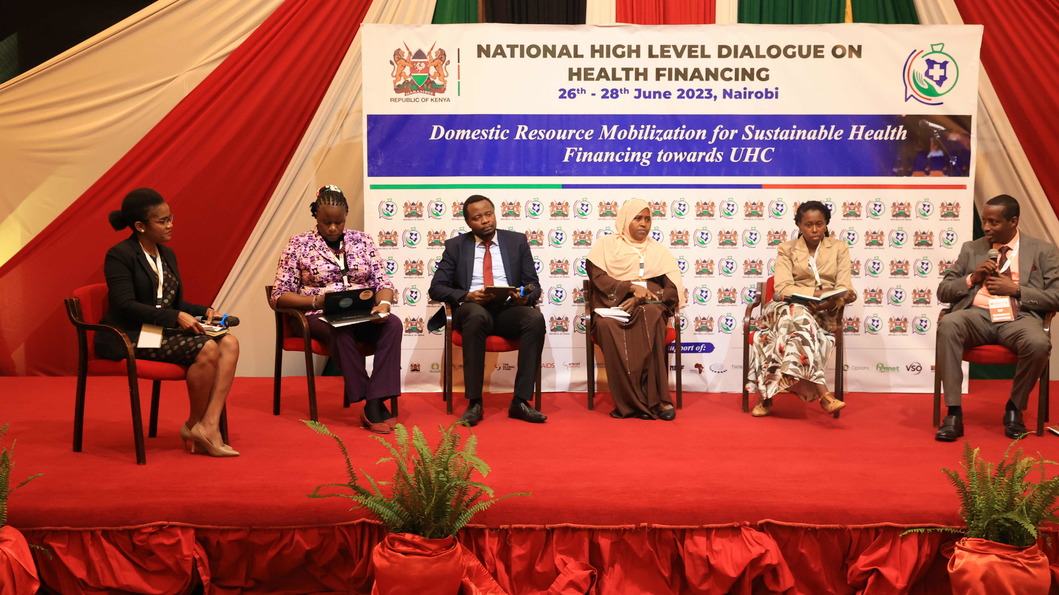News

Nairobi, Kenya, 30 June 2023 – Health sector stakeholders meeting in Nairobi called for urgent action to address persistently low government budget allocation to healthcare, further indicating that insufficient healthcare financing, has been exacerbated by inadequate use of data-driven, evidence-based decision-making on domestic health financing.
Kenya’s budget allocation to health is below 15% of the national budget, which also translates to below 5% of the recommended share of health budget to Gross Domestic Product (GDP). This is against the collective commitment made by Africa’s heads of state during the Abuja meeting in 2001, and subsequently the 2019 Africa Leadership Meeting which also committed to increase health budget allocation and ensuring efficient use of health resources.
At the “National High-Level Dialogue on Domestic Resource Mobilisation for Sustainable Health Financing Towards UHC“, stakeholders noted that there are often other overriding considerations such as political campaign pledges regarding resource allocation, hence neglecting the use of evidence, and this “culture,” they noted should be discarded if Kenya is to meet its commitments. The dialogue was held two weeks after Kenya’s Health Ministry received an allocation of Sh141.2 billion in the 2023/2024 budget. The allocation represents 11% of the total annual budget and is down from Sh146.8 billion in the 2022/23 financial year.
Over the past few months, the African Institute for Development Policy (AFIDEP) has provided technical support to county governments to better understand the Africa Leadership Meeting commitments in the health sector and develop a position paper that was presented at the dialogue.
“Data and evidence are critical components that should inform how the health sector is resourced,” said Dr Rose Oronje, AFIDEP’s Director of Public Policy and Knowledge Translation and Head of Kenya Office.
Dr Oronje, who was a Chief Facilitator at the dialogue, further noted that generation and use of data in domestic health financing in the country remains a major challenge despite the enormous benefits that result from using reliable data and evidence to guide resource allocation in the health sector. These major challenges include weak data management systems at both national and county levels and lack of willingness by state officials to make the data accessible for researchers to analyse and provide evidence to support the government in decision-making.
“Even as we ask for more money, we really don’t have the data and evidence that can tell us exactly how much ‘more’ money we need”, said Dr Oronje. She urged national and local governments as well as non-state actors to continue their “ongoing efforts to prioritise data, tools and metrics for measurement in domestic health financing.”
Research into high burden diseases affecting most Kenyans, as well the appropriate targets for resources to address them can inform government priorities and allocations on health. This will save citizens from exorbitant medical costs, especially the poorest. According to the Centre for Disease Control (CDC), 43% of Kenyans are unable to access primary healthcare due to poverty. Many have forgone the need to seek healthcare, putting lives at risk.
Various participants at the dialogue placed an emphasis on the need to adequately allocate funds to primary healthcare (PHC) levels, comprising community health promoters, and levels 2 and 3 of the healthcare system. They noted that PHC remains gravely underfunded in the country despite the crucial role it plays in improving health outcomes and reducing healthcare costs. PHC levels are meant to serve as the first point-of-service to Kenyans seeking medical attention, and adequate funding will reduce backlog at levels 4, 5 and referral hospitals.
Other suggestions provided include the need to streamline procurement procedures at the Kenya Medical Supplies Authority to weed out corruption that choke the authority and enable timely restocking of medical supplies in the hospitals. They also indicated that there is a need to develop innovative collaborative strategies by both national and county governments that will improve the availability of inexpensive health services such as preventive and pharmaceutical care, among others. Finally, they called for collaboration between the public and private sectors to increase the proportion of Kenyans who benefit from private insurance, particularly the great majority who cannot afford insurance coverage.
The national dialogue on domestic health financing aimed at mobilising diverse stakeholders to assess and review the health financing strategies in Kenya. It was also aimed to build consensus on health financing reform priorities that are technically viable and politically feasible to accelerate progress towards sustainable and effective domestic financing of health in the country.
Related Posts





